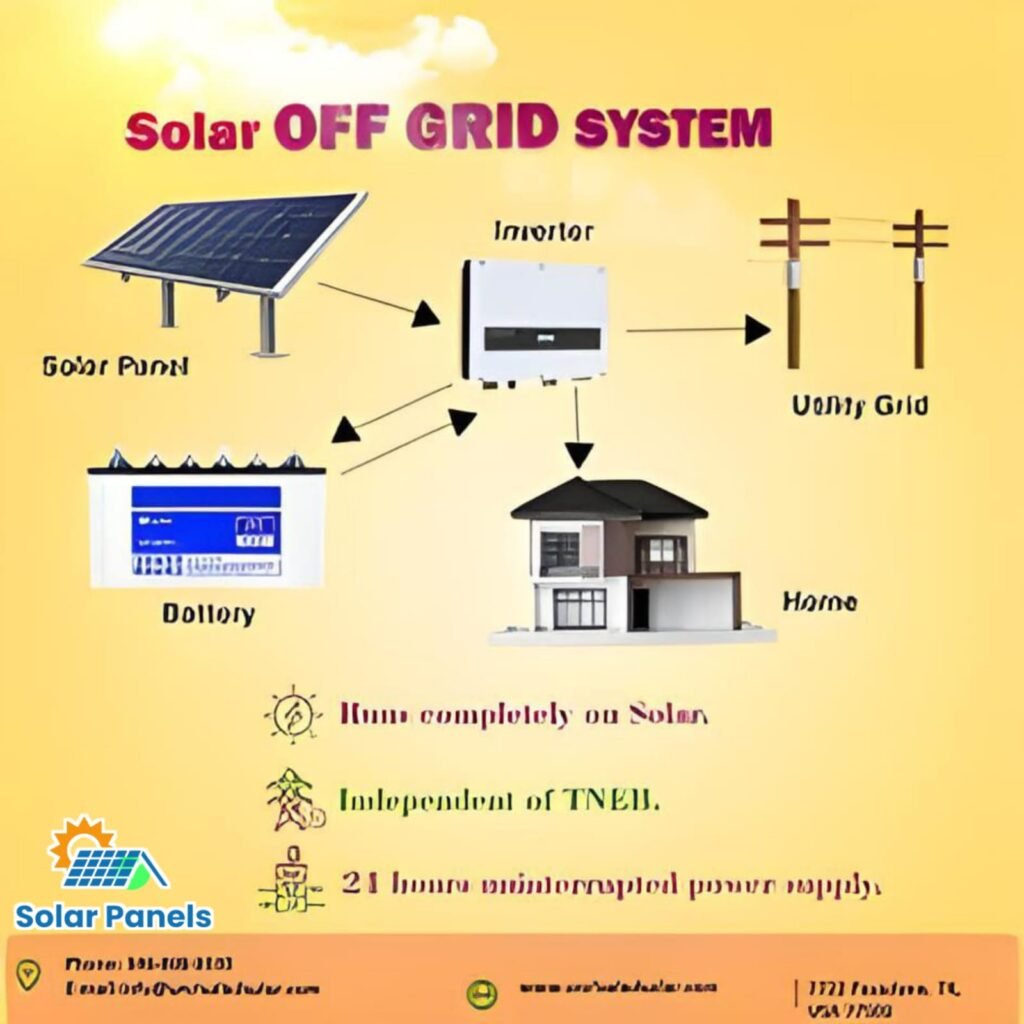
Table of Contents
ToggleOff-Grid Solar System
One of the most popular kinds of solar systems is the off-grid variety. Another name for them is independent power systems. Solar panels produce power, which is then sent to a battery bank via a charge controller. Off-Grid Solar System‘ inverters transform direct current (DC) into electrical current (AC), which powers buildings for homes and businesses. An off-grid system’s ability to store solar energy in batteries to withstand power outages is one of its key benefits.

Advantages of Off-Grid Solar Systems:
1. Energy Independence:
By producing their electricity, homes, and businesses can become less dependent on the national grid and utility organizations. This is made possible by off-grid solar systems. This is particularly important in South Africa, where power shortages and load shedding are commonplace.
- Reliability:
- In isolated or rural locations with limited or no connection to the national grid, off-grid solar systems offer a dependable source of electricity. This guarantees a stable power supply, which is necessary for day-to-day tasks and business operations.
- Environmental Benefits: By lowering greenhouse gas emissions and carbon footprints, solar energy is a clean, renewable resource. South Africans may fight climate change and protect the environment by using off-grid solar systems.
- Energy Security: Users of off-grid systems are not impacted by power outages, grid failures, or changes in the country’s electricity supply. Both home and commercial customers need this security.
- Scalability: Depending on the user’s energy requirements, off-grid systems can be scaled up or down. Its flexibility allows for steady expansion, facilitating cost management and accommodating changes in energy demand.
Disadvantages of Off-Grid Solar Systems:
1. Resource Availability: It can be difficult to find reliable solar parts and qualified installers in some places, particularly in remote or undeveloped locations. This may have an impact on the system’s overall performance and reliability.
- Regulatory and Policy Limits: It can be difficult to get around legal and policy frameworks. Off-grid system support or regulations may exist in some places, which can make installation more difficult.
- Upfront Financial Risk: In a challenging economic climate, a large upfront investment and possible ongoing costs may discourage numerous people and companies due to financial risk.
- Space Requirements: Installing solar panels and battery banks in off-grid solar systems takes up a significant amount of space. Properties with little space or those placed in very populated urban areas may find this difficult.
- Limitations on Energy Storage: The quantity of energy that may be stored for use during non-sunny times, including at night or on overcast days, can be limited by the capacity of battery storage. Careful energy management requires us to be vigilant because low storage capacity can cause blackouts.
FAQ’s:
What is an off-grid solar system?
Using solar panels and batteries, an off-grid solar system produces and stores its electricity, supplying power in remote areas without connection to the grid.
What are the workings of an off-grid solar system?
An off-grid solar system converts sunshine into energy and stores DC power into AC for use in a home. It consists of solar panels, a battery bank, a charge controller, and an inverter.
Which kind of batteries work best with off-grid solar power systems?
Lithium-ion batteries offer longer lifespan, efficiency, and less maintenance compared to lead-acid batteries, making them ideal for off-grid systems, but they also come at a higher cost.
Are off-grid solar systems reliable?
Off-grid solar systems are very reliable when properly planned and maintained. They supply steady power, particularly in areas like South Africa that receive a lot of solar energy.
Conclusion:
For South Africa, off-grid solar systems present an environmentally friendly, dependable, and self-sufficient energy source, especially in areas with little or no connection to the national grid. These systems offer a competitive alternative to conventional power sources by utilizing the region’s plentiful solar energy, promoting the preservation of the environment and energy security. Off-grid solar systems have many advantages, such as less dependency on fossil fuels, savings, and continuous power supply; however, their effective installation requires careful planning, design, and routine maintenance.
